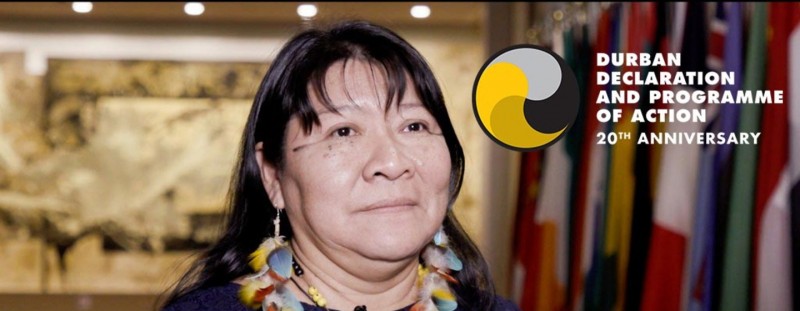Joenia Wapixana, activist for the rights of indigenous people in Brazil For almost 30 years, Brazilian activist Joenia Wapixana, has been fighting for indigenous land rights and against “institutionalized discrimination” in Brazil. In a special interview with UN News, to mark the 20th anniversary of the Durban Declaration and Programme of Action, she says it’s time to dedicate more resources to this fight. “My name is Joenia, I am a member of the Wapixchana indigenous tribe. My second education, as I always say, was the indigenous movement, working with indigenous organizations. And, above all, fighting for the collective rights of communities. Society needs to understand that discrimination against the indigenous has always existed in Brazil. There is discrimination against indigenous people who are not recognized or even respected. You can look through the available data on discrimination. Most of it is just about the Afro-descendant population, but not about the indigenous people. There is no data on this. Most studies do not address the issue of discrimination [against indigenous peoples]. So, when you see someone, such as a minister saying that indigenous people cannot wear Nike because that would conflict with indigenous customs; or criticizing an indigenous woman who uses an iPhone, as if this would take away her indigenous identity; or not recognizing the rights of indigenous peoples as Brazilian citizens, this is a kind of institutionalized discrimination. Joenia Wapixana With a law degree from the Federal University of Roraima, Ms. Wapixana has been advocating on behalf of indigenous communities in the Brazilian Amazon since the 1990s. In 2018, at the end of a long campaign, financed at the grassroots level by crowdfunding, she became the first indigenous woman elected to Brazil’s federal parliament. In that same year, she was awarded the UN Human Rights Prize, a high profile award whose previous winners have included Eleanor Roosevelt, Martin Luther King, and Nelson Mandela. After taking the “Raposa Serra do Sol” land dispute to the Inter-American Commission on Human Rights, Wapixana became the first indigenous lawyer to argue and win a case before the Supreme Court of Brazil. I believe that when a person has suffered racial discrimination, or is suffering from racism, it is necessary to protect them with the fullest extent of the law. Report the incident, even if nothing comes of it. It is important for us to create a record of this phase that we are going through. The Conference should also hold discussions on the inclusion of indigenous peoples in the debate on public policy, because it is essential to include in the fight the specific needs of the various groups. Resources and not just legislation [should be made available]. Because from the moment you recognize the problem, but you don’t have the structure in place to solve it with the financial resources to implement [the policy], you will end up suffering from the same discrimination, and in the same situation that you faced at the first Conference.” This article is one of a series of multimedia features published as part of the commemorations surrounding the twentieth anniversary of the UN’s Durban Declaration, considered to be a milestone in the global fight against racism. Joenia Wapixana:
The World Organization for Development has been endowed with consultative status with the UN ECOSOC since 2014. The World Organization for Development, which has consultative status wich the UN ECOSOC, develops and implements Global Initiatives to achieve the UN Sustainable Development Goals.




Comments are closed.